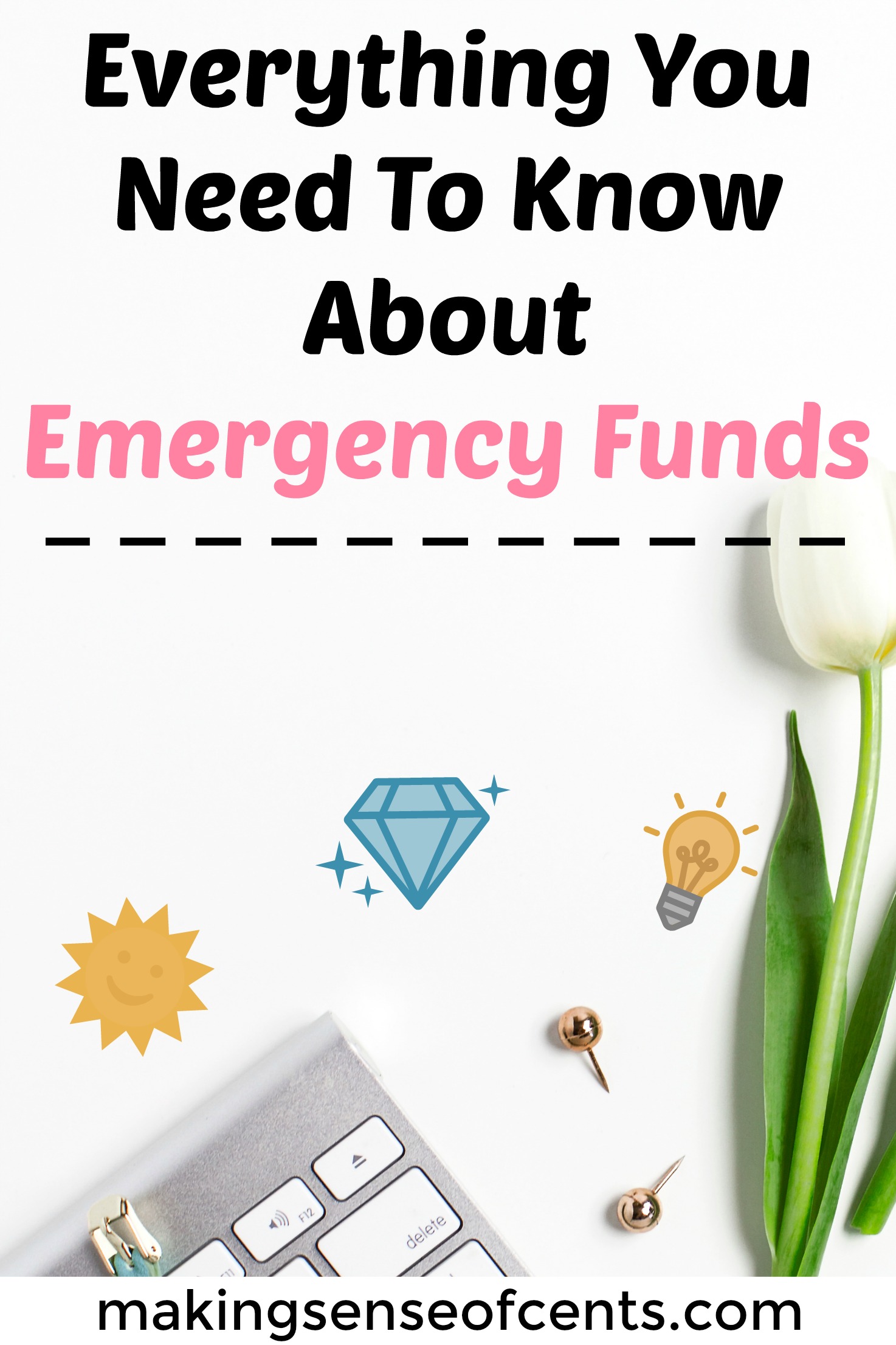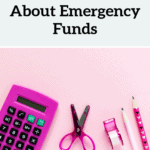 An emergency fund is something I believe everyone should have. However, according to a report by Bankrate.com, 26% of Americans have no emergency fund whatsoever for when they need money fast.
An emergency fund is something I believe everyone should have. However, according to a report by Bankrate.com, 26% of Americans have no emergency fund whatsoever for when they need money fast.
According to this same report, only 40% of families have enough in savings to cover three months of expenses, with an even lower percentage having the usually recommended six months worth of savings.
This is frightening to me, as having an emergency fund can greatly help a person get through tough parts in life.
For us, we have a 12 month emergency fund.
I’ve always been open about this. I am a rather big worrier about things, and having a large emergency fund gives me peace of mind, especially since we are self-employed and our income can vary from month to month.
Even if you aren’t self-employed, there are many other reasons to have a fully-funded emergency fund:
- An emergency fund can help you if you lose your job. No matter how stable you think your job is, there is always a chance that something could happen where you may need money fast. What would you do if you lost your job and didn’t have an emergency fund?
- An emergency fund is wise if you do not have great health insurance. This is another reason why we have a well-funded emergency fund. We do not have the greatest health insurance, with our deductible being over $12,000 annually. Having an emergency fund can help protect us if something were to happen to either of us.
- An emergency fund is a good idea if you have a car. You just never know if it may need a repair.
- An emergency fund is a need if you own a home. One of the lucky things that homeowners often get to deal with is an unexpected home repair. Having an emergency fund can help you if your basement floods, if a hole in your roof forms, and more.
- An emergency fund can protect you in many other areas as well. This can include if you have a medical cost for your pet, if you have to take time off work for something, you need to go somewhere far to visit someone who is sick, and so on. The list of reasons for why you might need an emergency fund can be a long one.
Emergency funds are always good to have because they can give you peace of mind if anything costly were to happen in your life. Instead of building onto your stress because of whatever has happened, at least you know you can afford to pay your bills and worry about more important things.
An emergency fund is also wise to have because it can help prevent unnecessary debt. There are too many people out there who count on their credit cards as their emergency fund and that is not a good idea. It can lead to debt spiraling out of control because of high interest rates.
Below is what you need to know about emergency funds for when you need money fast.
Should you have an emergency fund if you are in debt?
Yes! I still think you should have an emergency fund even if you have debt. If you have debt, then the usual recommended amount is to have $1,000 in your emergency fund before you start paying down your debt.
After that amount, you need to determine what you are comfortable with.
How much should be in an emergency fund?
The next question I often hear is “How much should be in an emergency fund?” How much money you decide to keep in your emergency fund is dependent on your specific situation. If you don’t have debt, then I usually recommend at least six months of expenses.
For us, I like to have one year of expenses saved since we are self-employed, own a house (although that will be changing soon), we have a high deductible health insurance plan, and for a few other reasons. There are many reasons for why a person might need money fast, and you need to analyze your specific situation.
Where should you keep an emergency fund?
Your emergency fund is there so that when you need money fast, you can use it. Due to this, you will want to put your money in a place where you can easily take it out. This means you do not want to be penalized for taking the money out and you probably don’t want to invest it in a high risk investment as you don’t want to lose it either.
I prefer keeping an emergency fund in a low risk savings account, such as any basic savings account that you will find at a bank. This way it is easily accessible in case anything were to happen and I needed the money quickly.
You can also save your emergency fund in a CD and/or money market account so that you can earn a little in interest. Keep in mind though that you might earn more in interest because there is a more risk.
How can I save enough money to fully fund my emergency fund?
After reading all of the above, I bet you cannot WAIT to start your emergency fund 🙂
It may be hard in the beginning to start saving for your emergency fund, but everyone has to start somewhere and it’s always best to be prepared for when you need money fast. You can save money for your emergency fund by setting out a certain amount out of each paycheck, or you can work towards making extra money so that you can build up your emergency fund even quicker.
Do you have an emergency fund? Why or why not? How much do you keep in it?


Leave a Reply
Emergency funds are crucial! I’d add ‘if you’re human, it’s a good idea to have an emergency fund’ :). I agree with you on a minimum of 6 months of living expenses. I’m also a worrier, so like you, we keep a year on hand, but I think 6 months is a great starting point.
Yes, 6 months is definitely a great amount to have.
CD’s have no more risk than a savings account and are backed by the FDIC. The risk is loosing your interest accrued, but varies from place to place. Since the FDIC insures an amount, and not the number accounts, I break my accounts into the min (usually $1k to $2.5k) so if I do need the money, I only take the hit on what I need. I also use a revolving CD ladder of $50k and have $10k or so in a savings account. This year I want to start a muni bond ladder, but will probably start at 1 year terms and then each year add another bond [ year 2 I will take out 1 year and 2 year].
I should have further explained what I meant. When I said “risk,” I meant that if you needed the money eventually (that being the risk), then you would take a hit.
We’re one of those families with no emergency fund 🙁 All of our efforts have been focused on paying off debt, however, I trust your advice. Maybe we should start by putting small amounts in a savings account over the next year?
Yes, I would definitely at least build a small one. You never know if you may need it.
Good luck! You can do it 🙂
Good job! Yes, definitely better than nothing. When do you think it will be fully funded?
Having an emergency fund is SO important. I’ve heard (more the once) the argument that you don’t need an emergency fund because “that’s what insurance is for”. We have excellence insurance all the way around (home, car, medical, dental) but there are still those expenses that pop up that are not covered by insurance or warranties.
Nope, insurance is definitely not enough!
Thanks for the great article! MK thinks I’m being too over the top with wanting a years worth of EF for us. But with all the uncertainty (like loosing your job out of nowhere) and the current economy it just makes more sense to cover yourself even more!
I don’t think it’s too over the top at all!
Yes, I have an emergency fund separate from my normal checking and savings account in my bank. I just seriously started saving for it in the Fall of 2013. I always had a small one, but it got used up and then some when my old car needed a lot of repairs. I’m currently working up to 6 months worth of expenses. I’m over a third of my way to my goal that I hope to hit by the end of next year. Having a designated E-Fund definitely helps me sleep better at night.
Good job!
I currently have an emergency fund of $500. I plan to get it up to $1000 by April. Doing that and paying off this debt is no joke.
Good job!
Right now mine only has just over $500 in it, but I’m adding to it each month. I don’t want to stop at $1k even though I have debt to pay off. I want to keep building until I hit the 3-6 months of expenses mark. Slow and steady wins the race right?
Good job Kayla! You are doing well 🙂
It really surprised me today when a coworker told me she had less than $100 to her name at the end of every month. Yikes! I’ve always been paranoid about being in a situation where I needed access to a larger amount of money (emergency) so I’ve always made sure I have enough to keep me covered for at least 6 months. I want to work it up to at least 12 months, but its a slow process with debt.
Yikes! That is scary to have only $100 at the end of every month.
Emergency funds are a must, especially if you’re in debt. Not having one can allow you to sink into deeper debt when the unexpected pops up. I’ve had to use my EF a lot for my car unfortunately since I drive so much. Since I am aggressively paying down debt, I’d be comfortable with at least 2 months of expenses in my EF. $1000 is not enough for me and could be gone in a flash. Anything can happen.
Yes, I agree!
I find it pretty amazing that the average person (of decent income) doesn’t keep a buffer between them and missed rent, car payments, and mortgages. I’m a believer in the 6 month rule and 12 is not unreasonable.
Thanks! I agree 🙂
Ack yeah that sounds a little excessive 🙂
Emergency funds are awesome and I’m really glad I had one in place when I lost my job!
I agree 🙂